2020年大学英语四级图表作文范文话题:可持续发展
可持续发展英语作文
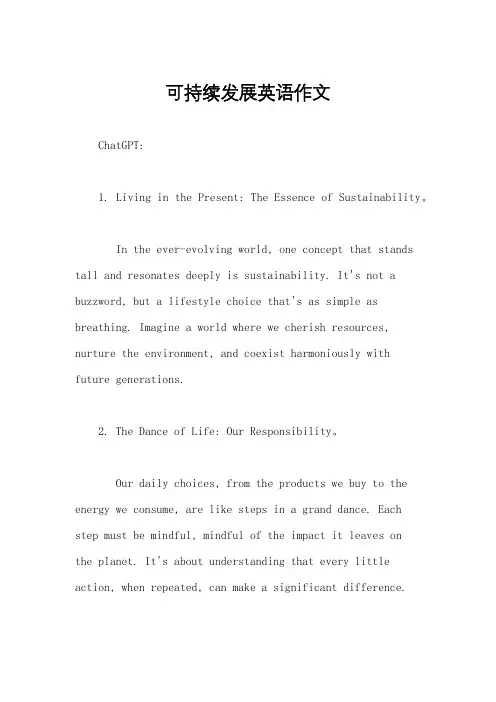
可持续发展英语作文ChatGPT:1. Living in the Present: The Essence of Sustainability。
In the ever-evolving world, one concept that stands tall and resonates deeply is sustainability. It's not a buzzword, but a lifestyle choice that's as simple as breathing. Imagine a world where we cherish resources, nurture the environment, and coexist harmoniously withfuture generations.2. The Dance of Life: Our Responsibility。
Our daily choices, from the products we buy to the energy we consume, are like steps in a grand dance. Each step must be mindful, mindful of the impact it leaves onthe planet. It's about understanding that every little action, when repeated, can make a significant difference.3. The Power of Community: A Sustainable Future。
Sustainability isn't a solitary pursuit; it's a collective effort. It's about building communities that prioritize sustainability, where every residentparticipates in conserving resources and protecting the environment. It's about collective learning and shared responsibility.4. The Green Revolution: Technology and Sustainability。
关于可持续发展的英语作文
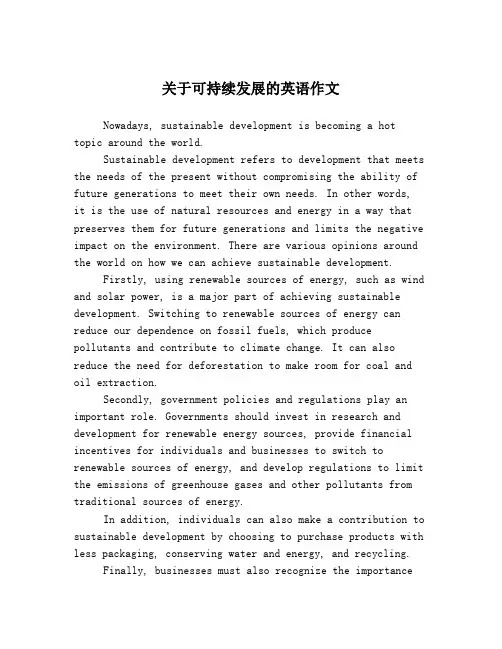
关于可持续发展的英语作文Nowadays, sustainable development is becoming a hottopic around the world.Sustainable development refers to development that meets the needs of the present without compromising the ability of future generations to meet their own needs. In other words,it is the use of natural resources and energy in a way that preserves them for future generations and limits the negative impact on the environment. There are various opinions around the world on how we can achieve sustainable development.Firstly, using renewable sources of energy, such as wind and solar power, is a major part of achieving sustainable development. Switching to renewable sources of energy can reduce our dependence on fossil fuels, which produce pollutants and contribute to climate change. It can also reduce the need for deforestation to make room for coal and oil extraction.Secondly, government policies and regulations play an important role. Governments should invest in research and development for renewable energy sources, provide financial incentives for individuals and businesses to switch to renewable sources of energy, and develop regulations to limit the emissions of greenhouse gases and other pollutants from traditional sources of energy.In addition, individuals can also make a contribution to sustainable development by choosing to purchase products with less packaging, conserving water and energy, and recycling.Finally, businesses must also recognize the importanceof sustainable development and adopt practices that take into consideration the long-term consequences of their actions. Companies should reduce their carbon footprint through energy efficiency and renewable energy usage, minimize waste, and develop products with less packaging and fewer toxic substances.In conclusion, sustainable development requires collaboration between individuals, governments and businesses. It requires recognizing that the environment and human health should be at the forefront of economic decisions.。
大学生如何实现可持续发展英语作文130
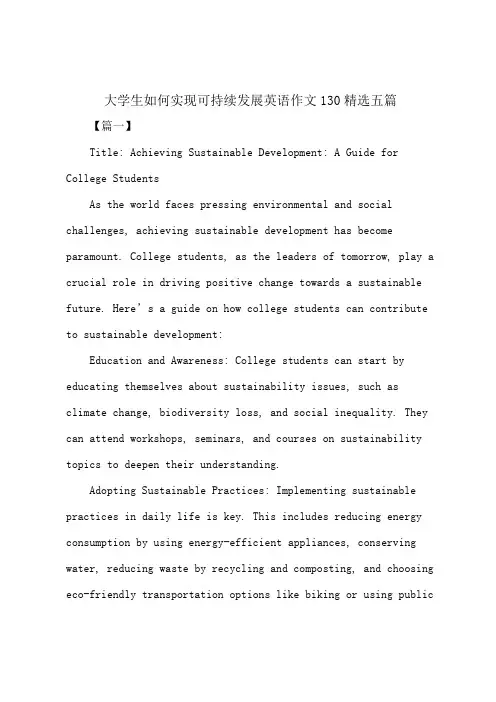
大学生如何实现可持续发展英语作文130精选五篇【篇一】Title: Achieving Sustainable Development: A Guide for College StudentsAs the world faces pressing environmental and social challenges, achieving sustainable development has become paramount. College students, as the leaders of tomorrow, play a crucial role in driving positive change towards a sustainable future. Here’s a guide on how college students can contribute to sustainable development:Education and Awareness: College students can start by educating themselves about sustainability issues, such as climate change, biodiversity loss, and social inequality. They can attend workshops, seminars, and courses on sustainability topics to deepen their understanding.Adopting Sustainable Practices: Implementing sustainable practices in daily life is key. This includes reducing energy consumption by using energy-efficient appliances, conserving water, reducing waste by recycling and composting, and choosing eco-friendly transportation options like biking or using publictransport.Promoting Sustainable Consumption: College students can make conscious choices as consumers by supporting ethical and sustainable brands, reducing single-use plastics, and optingfor products with minimal packaging. They can also advocate for sustainable food options on campus and support local farmers and businesses.Engaging in Activism and Advocacy: College students have a powerful voice in advocating for policy changes and raising awareness about sustainability issues. They can join environmental clubs, participate in protests and marches, and engage in discussions with policymakers to push for sustainable policies at the local, national, and global levels.Supporting Sustainable Initiatives on Campus: Many colleges and universities have sustainability initiatives in place, such as renewable energy projects, campus gardens, and eco-friendly campus policies. Students can get involved in these initiatives by joining sustainability committees, volunteering for campus clean-up events, or advocating for more sustainable practices within their institutions.Empowering Communities: College students can make a difference by getting involved in community-based projects that promote sustainability and social equity. This could include volunteering with local environmental organizations, participating in community gardens, or organizing educational workshops on sustainable living in underserved communities.Lifelong Learning and Collaboration: Sustainable development is an ongoing process that requires continuous learning and collaboration. College students should strive to stay informed about new developments in sustainability research and technology and collaborate with peers, experts, and community members to find innovative solutions tosustainability challenges.In conclusion, college students have a unique opportunity to contribute to sustainable development through education, advocacy, and action. By adopting sustainable practices intheir own lives, advocating for policy changes, and actively engaging with their communities, college students can help create a more sustainable and equitable world for future generations.【篇二】Title: Strategies for Sustainable Development Among College StudentsAs the global community grapples with pressing environmental and social challenges, the imperative of sustainable development becomes increasingly evident. College students, as the future leaders and stewards of our planet, bear a unique responsibility in fostering sustainable practices and promoting a resilient future. Here are several strategies for college students to actively contribute to sustainable development:Education and Awareness:College students should prioritize educating themselves about sustainability issues, ranging from climate change and resource depletion to social inequality and environmental degradation. They can engage in interdisciplinary studies, attend seminars, and participate in workshops dedicated to sustainability topics. Additionally, leveraging digital platforms and social media can facilitate the dissemination of information and raise awareness among peers.Adopting Eco-friendly Practices:Embracing sustainable habits in daily life is instrumental in reducing environmental impact. This includes conserving energy by turning off lights and unplugging electronics when not in use, reducing water consumption, minimizing waste through recycling and composting, and opting for eco-friendly transportation methods such as walking, cycling, or carpooling. Moreover, supporting sustainable fashion by choosing ethically produced clothing and reducing reliance on single-use plastics can further promote environmentally conscious behavior.Advocating for Institutional Change:College students possess the power to effect meaningful change within their educational institutions. By actively engaging with campus administrations and advocating for sustainable policies and practices, students can influence decisions regarding renewable energy adoption, waste management strategies, sustainable food options in campus dining facilities, and the integration of sustainability principles into academic curricula. Student-led sustainability committees and initiatives can serve as catalysts for institutionaltransformation.Promoting Sustainable Consumption:College students can make informed choices as consumers by supporting environmentally responsible businesses and products. Prioritizing local and organic produce, reducing consumption of disposable goods, and opting for products with minimal packaging can contribute to minimizing ecological footprint. Moreover, encouraging divestment from industries with adverse environmental impacts and advocating for sustainable investment practices can drive systemic change towards a greener economy.Engagement in Community Outreach:Collaborating with local communities and organizations is essential for fostering sustainable development beyond campus borders. College students can volunteer for environmental restoration projects, participate in community gardening initiatives, and organize educational workshops on sustainable living practices. By forging partnerships with community stakeholders, students can leverage collective efforts to address environmental challenges and promote social equity.Advocacy and Activism:College students possess a powerful voice in advocating for policy changes and social justice. Participating in environmental activism, organizing rallies and protests, and engaging in dialogue with policymakers can influence decision-making processes at local, national, and global levels. By amplifying the voices of marginalized communities disproportionately affected by environmental degradation, students can advocate for inclusive and equitablesustainability solutions.In conclusion, college students have a pivotal role to play in advancing sustainable development through education, advocacy, and action. By adopting environmentally conscious behaviors, advocating for institutional change, promoting sustainable consumption practices, engaging in community outreach, and leveraging their collective influence to drive systemic change, students can contribute to building a more resilient and sustainable future for generations to come.【篇三】Title: Strategies for Sustainable Development Among College StudentsAs our world faces increasingly urgent environmental and social challenges, the importance of sustainable development becomes ever more apparent. College students, as the future leaders of society, hold a unique position in driving sustainable practices forward. Here are some strategies they can employ:Education and Awareness:College students should prioritize learning about sustainability issues, from climate change to social inequality. Attending seminars, workshops, and using digital platforms can help spread awareness.Adopting Eco-friendly Practices:Simple habits like conserving energy, reducing water usage, and minimizing waste can significantly reduce environmental impact. Choosing sustainable transportation and fashion options is also crucial.Advocating for Institutional Change:Students can push for sustainable policies within their universities, influencing decisions on renewable energy, waste management, and sustainable food options.Promoting Sustainable Consumption:Supporting eco-friendly products and businesses, reducing consumption of disposable goods, and advocating for sustainable investments can all contribute to a greener economy.Engagement in Community Outreach:Collaborating with local communities on environmental projects and organizing educational workshops can extend the impact of sustainable practices beyond campus.Advocacy and Activism:Students can use their voices to advocate for policy changes and social justice, participating in activism and dialogue with policymakers.In conclusion, by educating themselves, adopting eco-friendly habits, advocating for change, promoting sustainable consumption, engaging with communities, and advocating for policy changes, college students can play a significant role in achieving sustainable development.【篇四】Title: The Role of College Students in Achieving Sustainable DevelopmentSustainable development is a pressing global concern, and college students have a vital role to play in addressing it. Here are some strategies they can employ:Education and Awareness: College students should prioritize learning about sustainability issues, attending seminars, workshops, and utilizing digital platforms to spread awareness about climate change, environmental degradation, and social inequality.Adopting Eco-friendly Practices: Implementing simple habits such as conserving energy, reducing water usage, minimizing waste, and opting for sustainable transportation and fashion choices can significantly reduce their environmental footprint.Advocating for Institutional Change: Students can advocate for sustainable policies within their universities, influencing decisions regarding renewable energy, waste management, and sustainable food options on campus.Promoting Sustainable Consumption: Supporting eco-friendly products and businesses, reducing the consumption of disposable goods, and encouraging sustainable investments contribute to building a greener economy.Engagement in Community Outreach: Collaborating with local communities on environmental projects and organizing educational workshops extend the impact of sustainable practices beyond campus, fostering a culture of sustainability.Advocacy and Activism: Utilizing their voices to advocate for policy changes and social justice, participating in activism, and engaging in dialogue with policymakers can drive significant progress towards achieving sustainable development goals.In conclusion, through education, adopting eco-friendly practices, advocating for institutional change, promoting sustainable consumption, engaging in community outreach, and activism, college students can make meaningful contributions to the global effort towards sustainable development.【篇五】Title: Empowering College Students for Sustainable DevelopmentIn the pursuit of sustainable development, college students wield immense potential as catalysts for change. Here’s how they can harness their capabilities:Educational Empowerment: By immersing themselves in the study of sustainability issues, attending seminars, and leveraging digital platforms, students can amplify awareness about pressing concerns like climate change and social inequity.Embracing Eco-Conscious Habits: Through the adoption ofeco-friendly practices such as energy conservation, water preservation, waste reduction, and opting for sustainable modes of transportation and fashion, students can tangibly reduce their ecological footprint.Institutional Influence: Students possess the power to advocate for sustainable policies within their universities, championing initiatives related to renewable energy, waste management, and the promotion of sustainable food options on campus.Championing Sustainable Consumption: By endorsing environmentally responsible products and businesses, curtailing the use of disposable goods, and advocating for sustainable investment practices, students contribute to the advancement of a more eco-centric economy.Community Collaboration: Engaging in collaborative efforts with local communities on environmental projects and organizing educational workshops serve to broaden the impact of sustainable endeavors, fostering a culture of sustainability beyond campus confines.Advocacy and Activism: Through the vocalization of their convictions, active participation in advocacy campaigns, and constructive dialogue with policymakers, students can exert substantial influence in effecting policy changes and driving social justice agendas.In summation, by empowering themselves through education, adopting eco-conscious behaviors, advocating for institutional change, championing sustainable consumption, collaborating with communities, and engaging in advocacy and activism, college students emerge as formidable agents of sustainable development.。
以可持续发展为主题的作文英文
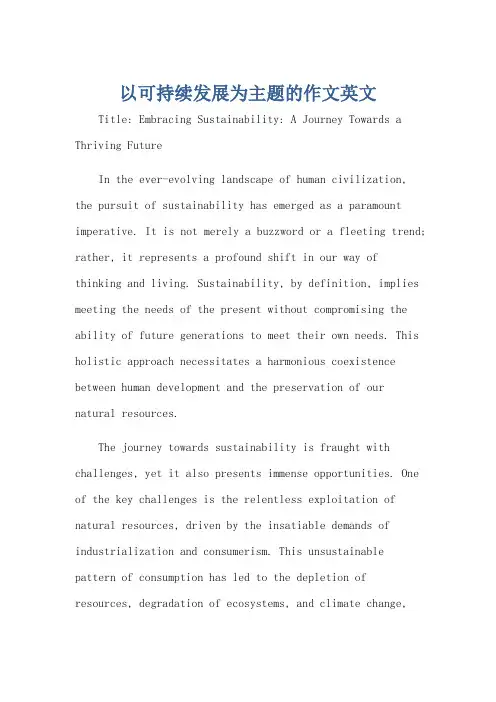
以可持续发展为主题的作文英文Title: Embracing Sustainability: A Journey Towards a Thriving FutureIn the ever-evolving landscape of human civilization, the pursuit of sustainability has emerged as a paramount imperative. It is not merely a buzzword or a fleeting trend; rather, it represents a profound shift in our way ofthinking and living. Sustainability, by definition, implies meeting the needs of the present without compromising the ability of future generations to meet their own needs. This holistic approach necessitates a harmonious coexistence between human development and the preservation of ournatural resources.The journey towards sustainability is fraught with challenges, yet it also presents immense opportunities. One of the key challenges is the relentless exploitation of natural resources, driven by the insatiable demands of industrialization and consumerism. This unsustainablepattern of consumption has led to the depletion of resources, degradation of ecosystems, and climate change,posing a significant threat to our planet's ecological balance.However, the realization of the gravity of these challenges has sparked a global movement towards sustainability. Governments, businesses, and individuals are increasingly recognizing the need for a paradigm shift towards more sustainable practices. This shift involves a transition from a linear economy, where resources are extracted, used, and discarded, to a circular economy that emphasizes resource efficiency and waste reduction.The circular economy approach promotes the reuse, repair, and recycling of materials, minimizing waste and maximizing the utilization of resources. This not only reduces the environmental impact of human activities but also creates economic opportunities. For instance, the recycling industry has grown significantly in recent years, generating jobs and revenue while contributing to the reduction of waste.Moreover, the adoption of renewable energy sources such as solar and wind power is another crucial aspect of sustainable development. These clean energy sources offer aviable alternative to fossil fuels, reducing greenhouse gas emissions and mitigating the effects of climate change.In addition to these macro-level changes, individuals also play a pivotal role in promoting sustainability. Simple lifestyle choices like reducing food waste, conserving water, and using public transportation can have a significant impact on reducing our carbon footprint. Furthermore, the rise of the "green consumer" movement has also spurred businesses to innovate and offer more sustainable products and services.However, the journey towards sustainability is far from complete. The challenges we face are complex and multifaceted, requiring a concerted effort from all stakeholders. Governments need to adopt policies that promote sustainability and enforce regulations to ensure compliance. Businesses must prioritize sustainability in their operations and invest in innovative technologies that reduce their environmental impact. And individuals must continue to make sustainable choices in their daily lives and raise awareness about the importance of sustainability.In conclusion, sustainability is not just a goal; it is a journey that requires continuous effort and innovation. As we navigate this journey, we must remember that the future of our planet and its inhabitants depends on our collective actions today. By embracing sustainability, we can ensure a thriving and resilient future for all.。
可持续发展英文作文
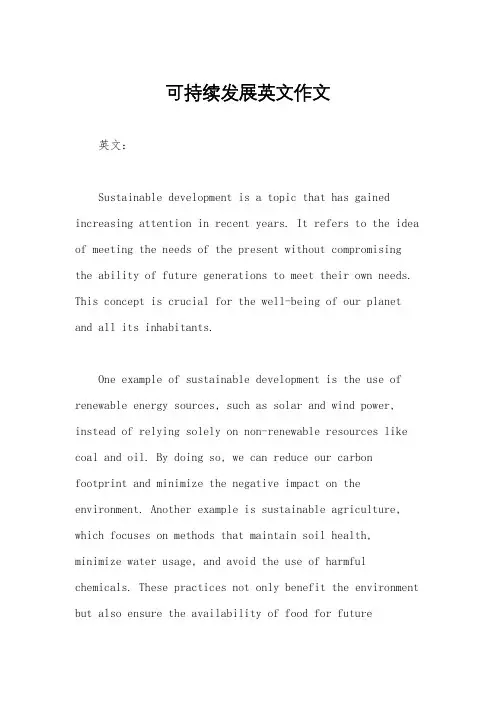
可持续发展英文作文英文:Sustainable development is a topic that has gained increasing attention in recent years. It refers to the idea of meeting the needs of the present without compromising the ability of future generations to meet their own needs. This concept is crucial for the well-being of our planet and all its inhabitants.One example of sustainable development is the use of renewable energy sources, such as solar and wind power, instead of relying solely on non-renewable resources like coal and oil. By doing so, we can reduce our carbon footprint and minimize the negative impact on the environment. Another example is sustainable agriculture, which focuses on methods that maintain soil health, minimize water usage, and avoid the use of harmful chemicals. These practices not only benefit the environment but also ensure the availability of food for futuregenerations.In addition to environmental sustainability, sustainable development also encompasses social and economic aspects. For instance, fair labor practices and access to education and healthcare are essential for creating a more equitable society. Moreover, economic growth should be pursued in a way that does not deplete natural resources or harm the well-being of communities.It is important to realize that achieving sustainable development requires collective effort. Governments, businesses, and individuals all have a role to play in promoting sustainable practices. For instance, governments can implement policies that support renewable energy and conservation efforts, while businesses can adopt sustainable production methods and invest in green technologies. As individuals, we can contribute by making conscious choices in our daily lives, such as reducing waste, using public transportation, and supporting ethical brands.In conclusion, sustainable development is not just a buzzword, but a necessary approach to ensure a better future for all. By taking into account the environmental, social, and economic impacts of our actions, we can work towards a more sustainable world for generations to come.中文:可持续发展是近年来越来越受到关注的话题。
谈谈可持续发展英语作文
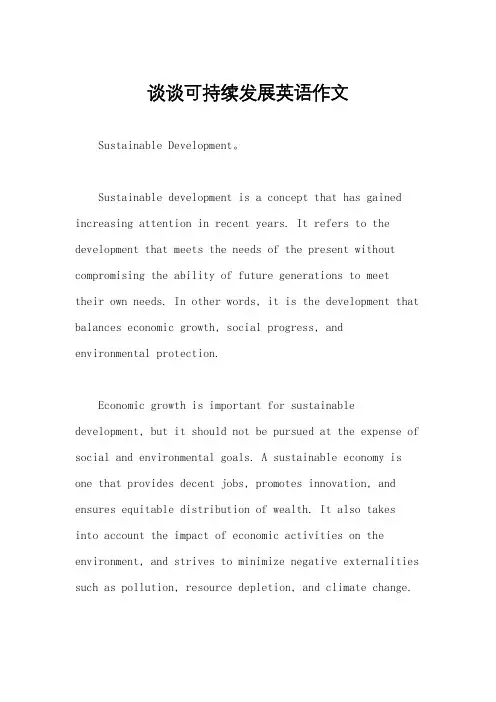
谈谈可持续发展英语作文Sustainable Development。
Sustainable development is a concept that has gained increasing attention in recent years. It refers to the development that meets the needs of the present without compromising the ability of future generations to meettheir own needs. In other words, it is the development that balances economic growth, social progress, and environmental protection.Economic growth is important for sustainable development, but it should not be pursued at the expense of social and environmental goals. A sustainable economy is one that provides decent jobs, promotes innovation, and ensures equitable distribution of wealth. It also takesinto account the impact of economic activities on the environment, and strives to minimize negative externalities such as pollution, resource depletion, and climate change.Social progress is also a key component of sustainable development. It means improving the quality of life for all people, especially the most vulnerable and marginalized. This includes access to education, healthcare, housing, and other basic needs. It also means promoting social inclusion, diversity, and equality, and ensuring that everyone has a voice in decision-making processes.Environmental protection is perhaps the most critical aspect of sustainable development. It involves preserving the natural resources and ecosystems that support life on earth. This includes protecting biodiversity, reducing greenhouse gas emissions, conserving water and energy, and promoting sustainable agriculture and forestry. It also means adopting a circular economy that minimizes waste and pollution, and promotes the use of renewable resources.Achieving sustainable development requires collective action and collaboration among governments, businesses,civil society, and individuals. It requires a long-term perspective, and a commitment to balancing economic, social, and environmental goals. It also requires innovation,creativity, and a willingness to experiment and learn from failures.In conclusion, sustainable development is a complex and multifaceted concept that requires a holistic approach to development. It is a vision for a better future that balances economic growth, social progress, and environmental protection. It is a challenge that requires the collective efforts of all stakeholders to achieve.。
未来可持续发展的英语作文
未来可持续发展的英语作文(中英文实用版)English:Sustainable development is a crucial aspect of our future.As the world population continues to grow, we must find ways to ensure that our needs do not compromise the ability of future generations to meet their own needs.This means that we must balance economic development with environmental protection and social well-being.中文:可持续发展是我们未来的关键方面。
随着世界人口的持续增长,我们必须找到确保我们的需求不会compromise 未来几代人满足自己需求的能力的方法。
这意味着我们必须平衡经济发展与环境保护和社会福祉。
English:One way to achieve sustainable development is through the adoption of renewable energy sources.Fossil fuels are depleting and contribute to climate change, while renewable energy sources such as solar and wind power are clean and abundant.By investing in research and development of these technologies, we can reduce our reliance on fossil fuels and move towards a more sustainable future.中文:实现可持续发展的方法之一是通过采用可再生能源。
2020年英语四级图表作文模板:可持续发展
2020年英语四级图表作文模板:可持续发展Directions:ぁHow can we meet the needs of today without diminishing the capacity of future generations to meet theirs? Sustainable development implies a broad viewof human welfare, a long term perspective about social development. Write an essay which should cover:ぁ1) describing the set of drawings below,ぁ2) stating its main idea, andぁ3) giving your comment.ぁ范文1:オァThe images above are both meaningful and instructive:this man's hard work is not only for his own benefit, but also for the benefit of future generations. ァThe pictures serve to remind us that the existence of our current happiness and valuable national heritage is due to the struggles of our predecessors.We, in turn, should also work hard in order to guarantee the comfort and safety of generations to come. Sustainable development has become a topic of heated debate in recent years. While it is justifiable to satisfy current demands, we cannot neglect the needs of our descendants in the process. Our children also depend on Earth's natural resources and we should not deprive them of such necessities. ァUnfortunately, many people only think of their short瞭erm, personal interests. An entire forest might be clear瞔ut, in the interest of making a profit, without a single tree planted in its place. This inconsiderate attitude towards the welfare of our descendants, as well the indifference to the outcome of such reckless actions, can only turn Earth into a cold and lifeless planet. People must be taught to appreciate Earth as not only their home, but also the home of ourchildren and grandchildren, as well as all other plants and animals.ァWhile making great efforts to increase our currentquality of life, we must simultaneously consider how our actions will affect future lives.译文:オァ上面的漫画意味深长而发人深省,栽树人的艰辛劳作不但仅为了他自己,也是为了后人。
可持续发展英文作文
可持续发展英文作文Sustainable development is crucial for the future of our planet. It means meeting the needs of the present without compromising the ability of future generations to meet their own needs. We need to find ways to balance economic, social, and environmental factors in order to create a sustainable future for all.One way to promote sustainable development is to focus on renewable energy sources. By investing in solar, wind, and hydro power, we can reduce our reliance on fossil fuels and decrease our carbon footprint. This will not only help to combat climate change, but also create new job opportunities and stimulate economic growth.Another important aspect of sustainable development is the conservation of natural resources. We need to find ways to reduce, reuse, and recycle in order to minimize waste and protect our environment. This includes using sustainable farming practices, protecting forests andoceans, and promoting responsible consumption.In addition, sustainable development requires us to address social issues such as poverty, inequality, and access to education and healthcare. By promoting fair trade, empowering women and marginalized communities, andinvesting in education and healthcare, we can create a more equitable and sustainable society for all.It's also important to consider the role of businesses and governments in promoting sustainable development. Businesses can adopt sustainable practices and invest in green technologies, while governments can create policies and regulations that support sustainability and hold businesses accountable for their environmental and social impact.In conclusion, sustainable development is a complex and multifaceted concept that requires action on multiple fronts. By promoting renewable energy, conserving natural resources, addressing social issues, and engagingbusinesses and governments, we can work towards a moresustainable future for all. It's time for all of us to take responsibility and make a positive impact on the world.。
可持续发展措施英文作文
可持续发展措施英文作文英文回答:Sustainable development refers to the practice of using resources in a way that meets the needs of the present generation without compromising the ability of future generations to meet their own needs. It is crucial for us to adopt sustainable development measures in order to protect our environment, promote economic growth, and ensure social well-being.One of the key sustainable development measures is the promotion of renewable energy sources. We need to shift away from relying heavily on fossil fuels and instead invest in renewable energy such as solar, wind, and hydro power. This not only reduces greenhouse gas emissions and air pollution, but also ensures a long-term and sustainable energy supply.Another important measure is the conservation ofnatural resources. We should strive to minimize waste and maximize resource efficiency. This can be done through recycling, reducing unnecessary consumption, and implementing sustainable practices in industries and agriculture. By conserving resources, we can reduce environmental degradation and maintain a healthy ecosystem.Furthermore, sustainable development also involves addressing social issues such as poverty and inequality. It is important to ensure that economic growth benefits all members of society and does not leave anyone behind. This can be achieved through providing equal access to education, healthcare, and employment opportunities. By promotingsocial inclusion and reducing poverty, we can create a more sustainable and equitable society.中文回答:可持续发展是指在满足当前一代需求的同时,不损害未来一代满足自身需求的能力的做法。
- 1、下载文档前请自行甄别文档内容的完整性,平台不提供额外的编辑、内容补充、找答案等附加服务。
- 2、"仅部分预览"的文档,不可在线预览部分如存在完整性等问题,可反馈申请退款(可完整预览的文档不适用该条件!)。
- 3、如文档侵犯您的权益,请联系客服反馈,我们会尽快为您处理(人工客服工作时间:9:00-18:30)。
2020年大学英语四级图表作文范文话题:可持续发展Directions:
How can we meet the needs of today without diminishing the capacity of future generations to meet theirs? Sustainable development implies a broad view
of human welfare, a long term perspective about social development. Write an essay which should cover:
1) describing the set of drawings below,
2) stating its main idea, and
3) giving your comment.
范文1:
The images above are both meaningful and instructive:
this man's hard work is not only for his own benefit, but also for the benefit of future generations.
The pictures serve to remind us that the existence of our current happiness and valuable national heritage is due to the struggles of our predecessors.
We, in turn, should also work hard in order to guarantee the comfort and safety of generations to come. Sustainable development has become a topic of heated debate in recent years. While it is justifiable to satisfy current demands, we cannot neglect the needs of our descendants in the process. Our children also depend on Earth's natural resources and we should not deprive them of such necessities.
Unfortunately, many people only think of their short term, personal interests. An entire forest might be clear cut, in
the interest of making a profit, without a single tree
planted in its place. This inconsiderate attitude towards the welfare of our descendants, as well the indifference to the outcome of such reckless actions, can only turn Earth into a cold and lifeless planet. People must be taught to appreciate Earth as not only their home, but also the home of our
children and grandchildren, as well as all other plants and animals.
While making great efforts to increase our current
quality of life, we must simultaneously consider how our actions will affect future lives.
译文:
上面的漫画意味深长而发人深省,栽树人的艰辛劳作不但仅为了
他自己,也是为了后人。
这幅漫画是为了提醒我们今天的幸福生活和宝贵的民族遗产归功
于我们祖先的奋斗,而我们,反过来,也要努力劳动来确保我们后代
的幸福和平安。
可持续发展是近几年的热点话题,虽然我们要满足自己当前的需要,但不能将子孙后代的需求抛置脑后。
我们的孩子同样需要自然资源,我们不能剥夺他们的这份必需品。
不幸的是很多人只考虑他们短
视的、自私的利益。
为了获得利润,整片的森林被砍光,一棵树都不
留下。
这种不顾及子孙福利的态度,和对这种轻率行为的后果的无动
于衷,只会让我们的地球变成一个冷冰冰而无生气的行星。
必须告诫
人们的是:地球不但是他们的家园,也是他们的孩子和所有后代的家园,还是其他所有的植物和动物的家园。
在努力提升今天的生活质量的同时,我们必须考虑到我们的行为会对未来的生命产生什么样的影响。
范文2:
As can be seen from the drawings, the father has planted a small tree thatgrows into a big one and is left to his son to enjoy. Years later, his son sits under the big tree enjoying its shade.
In social development, we should not over utilize our natural resources, as in the case of forests. A reasonable use of forests and reforestation are the best choices in the long run. Human beings should plan ahead when it comes to social development. Even though trees are in short demand today, we must still keep
the deforestation under control, for we do not want to eliminate all of our forests, which are essential to our existence. Reforestation is another wise practice. We may not fully benefit from planting trees for the time being, but we must continue doing so, since it will benefit later generations.
From the point of view of sustainable development, we have the responsibility to ensure that future generations have enough natural resources to use and arenot penalized for the shortsightedness of present day decision makers. In otherwords, we should not use up our natural resources just to meet our own present day needs, while ignoring the future of our planet.
译文:。
